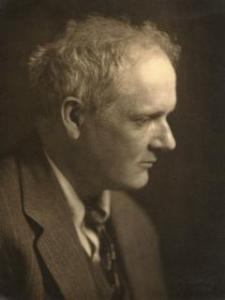Donald Francis Tovey was born in 17 July 1875 in Eton, England. His elder brother Duncan served in the London Scottish Regiment and was a founder of their Regimental Association, The Glenworple Highlanders. Both boys were musical; Duncan wrote military songs, and Donald began playing the piano and composing at an early age. Their father was assistant master of classics at Eton college. Donald’s gift was soon recognised and he was prevented from going to the public school by his piano teacher, Sophie Weisse. Instead he was taught counterpoint by Walter Parrett and composition by Hubert Parry.
He was awarded a scholarship to the ancient Balliol College – a college founded by the father of King John Balliol of Scotland – in Oxford gaining an third class degree in philosophy and ethics. (His was a joint degree in history and philosophy, the philosophy examiners felt he was a first class student, the historians weren’t at all impressed; the third was a compromise.)
His career developed still under the tutelage of his piano teacher Sophie Weisse, she even financed his Piano Concerto. Miss Weisse had a host of contacts, and before long Tovey was writing articles for The Times too. In 1911 he began writing articles for the Edinburgh based Encyclopedia Britannica mainly regarding 18th and 19th century music.
In 1914 he moved to Edinburgh and Scotland became his home from then on. (Weisse followed him, buying a flat near the university.) He became the Reid Professor of Music at the University of Edinburgh, taking over from Frederick Niecks, a post Tovey held until his death. In 1917 he founded the University’s Reid Orchestra which survived until the 1980s and taught many of Scotland’s up and coming composers of the time, Erik Chisholm, William Wordsworth and Robert Bruce among them.
He was knighted in 1935.
Tovey died in Edinburgh on 10 July 1940. He bequeathed to Edinburgh University his library of scores and music books. A portrait of him in concert at the piano by Morris Meredith Williams, art master of Fettes College in Edinburgh, is owned by the National Galleries of Scotland.
Today he is best known for his books on musical analysis, but he was also a noted composer.
Selected works :-
Sonata for 2 Cellos in G Major : ![]()
Piano Trios : ![]()
The opera The Bride of Dionysus : ![]()
Cello Concerto, Op. 24 : ![]()
Symphony in D : ![]()
Elegiac Variations, Cello Sonata Op. 4 : ![]()
Piano Concerto in A major, Op. 15 : ![]()
Cello Sonata, Op. 8 : ![]()
Variations on a theme of Gluck : ![]()
His book The Form of Music is still available : ![]()


